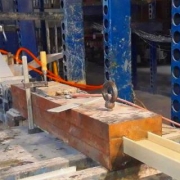RTU scientists are developing advanced technology for the production of composite materials
Scientists at Riga Technical University (RTU) are developing advanced technology to make composite materials used in construction and infrastructure, aeronautics, automotive and shipbuilding 30% more efficient and cheaper.
One of the most widespread and fastest growing composite materials in the world is pultrusion – when passed through a heated mold, fiberglass raw materials are impregnated with thermosetting resins. In Latvia, most of the resins are based on epoxy, polyester and vinyl ester. The pultrusion process produces a variety of bars, angles and double-T profiles, as well as curved profiles (with constant cross-section), such as wind turbine rotor blades. It is also possible to produce high-quality pelted profiles with protective coatings that are light and durable, with excellent mechanical and chemical properties, resistance to aggressive environments such as fire or corrosion. This is important in a variety of material applications, such as reinforced concrete, where composite bars and non-corroded gratings are used instead of metal reinforcement and are used intensively in port construction.
The traditional pultrusion process, which uses electric heaters to heat molds, has been known since the 1950s, when it was patented. Researchers of the Institute of Materials and Structures of RTU Faculty of Civil Engineering, under the guidance of Professor Evgeny Barkanov, in cooperation with Juvitek Ltd., are planning to significantly increase the efficiency of this process by using new heating sources, reducing production steps and real-time
The electric heaters used to date are characterized by high heat losses, so scientists suggest replacing them with high-frequency heat sources, namely microwaves. This would increase energy efficiency by 30%.
In turn, optimizing and automating the pultrusion process could reduce profile costs by up to 35%, scientists estimate. They develop an innovative in-line pultrusion process that combines several production steps, such as profiling, polymerization, surface preparation and coating, into one. This new idea will significantly increase production speed while reducing the number of employees involved in the process, says Pavel Akashin, a researcher at the RTU Institute of Materials and Structures. Advanced technology will also be more environmentally and human friendly by reducing volatile organic compound and fine particle emissions from the production of profiles and the application of coatings.
It is also planned to develop a combined prototype of in-line ultrasound and optical measuring equipment for quality control of pultruded profiles online. The equipment is required to ensure that the finished materials do not show cracks, pores and resins are fully polymerized.
The research project will generate new knowledge to improve the competitiveness of the Latvian economy, and its results and inventions will be useful to local and international manufacturers of thermosetting and thermoplastic composite materials and structures for the development of new high value-added products. These products will continue to promote the use of lightweight composite materials in various applications such as aeronautics, automotive and shipbuilding, construction and infrastructure.
The project “Improvement of the Effectiveness of Traditional Pultrusion Processes” (project no.1.1.1.1 / 18 / A / 053) is being implemented with financial support from the ERDF under the “Practical Studies” program. The project will be completed in 2022.

